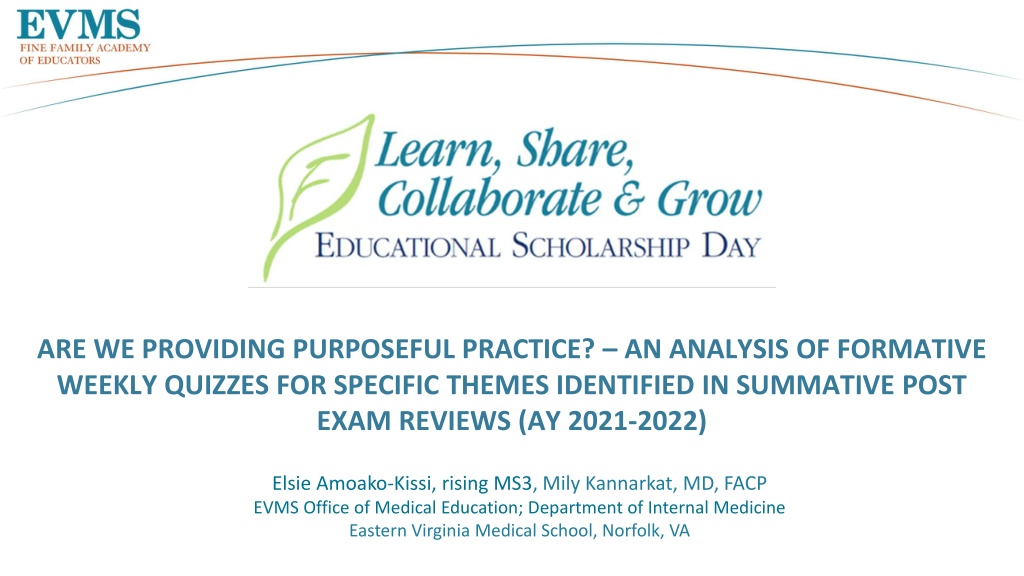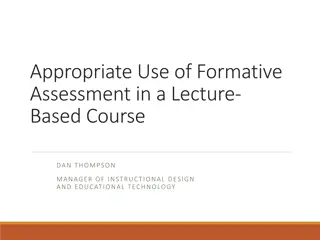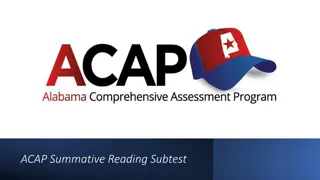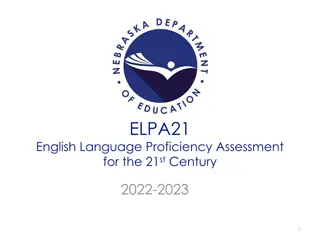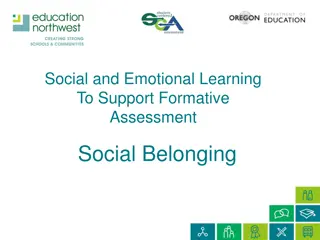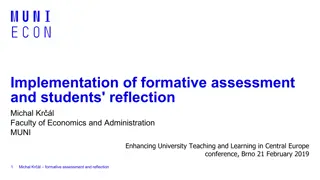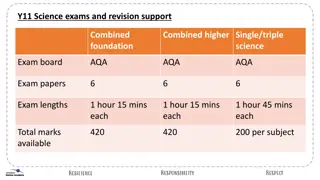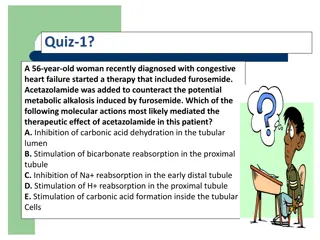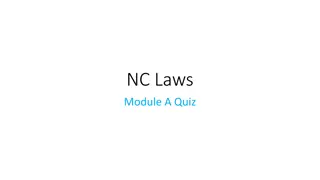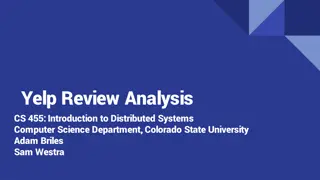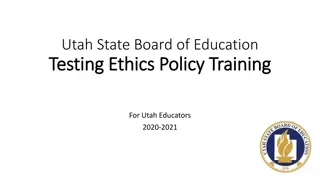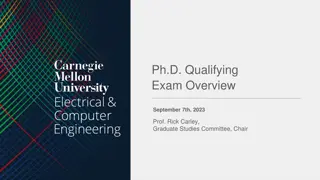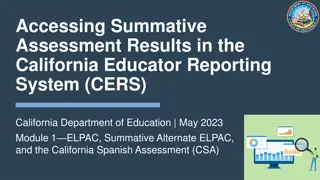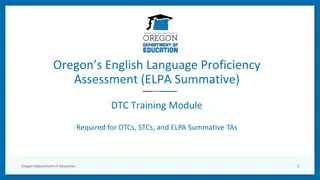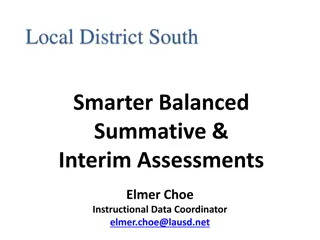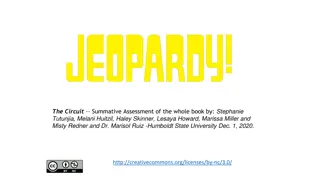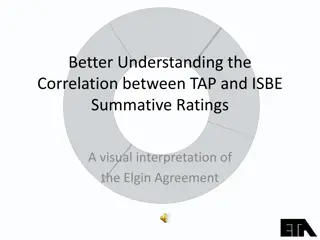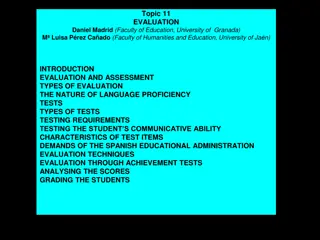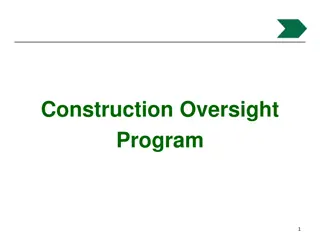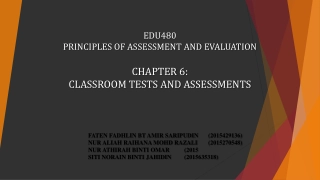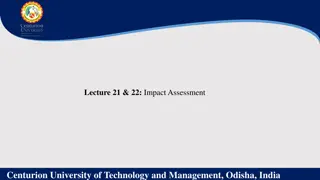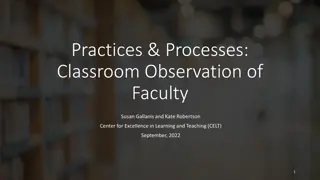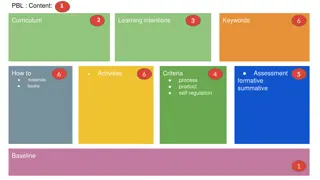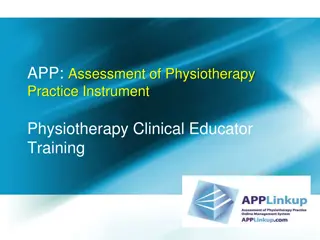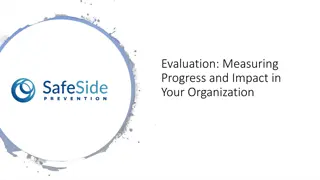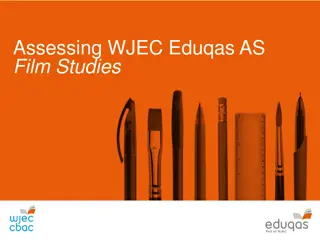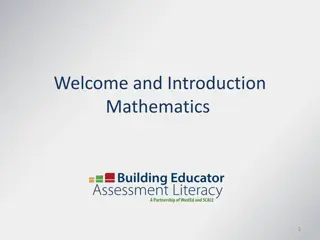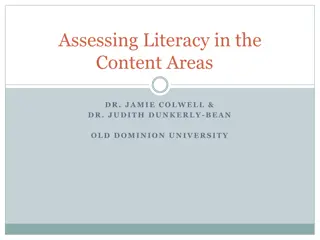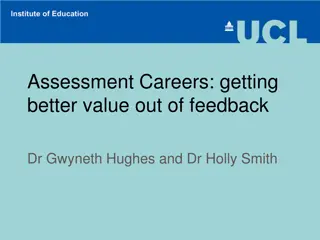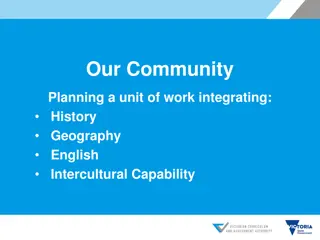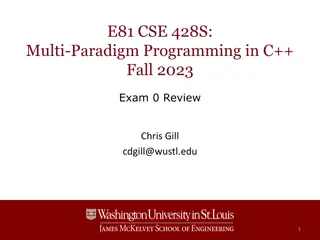Analysis of Formative Weekly Quizzes for Summative Post-Exam Reviews (AY 2021-2022)
In this study, weekly quizzes administered to MD students at EVMS were analyzed to assess the effectiveness of formative practice for summative exams. The analysis focused on specific question types and their distribution across modules, revealing insights into the depth of understanding and integration of knowledge among medical students. The results indicated predominant question types, highlighting areas for potential improvement in the curriculum.
Download Presentation

Please find below an Image/Link to download the presentation.
The content on the website is provided AS IS for your information and personal use only. It may not be sold, licensed, or shared on other websites without obtaining consent from the author. Download presentation by click this link. If you encounter any issues during the download, it is possible that the publisher has removed the file from their server.
E N D
Presentation Transcript
ARE WE PROVIDING PURPOSEFUL PRACTICE? AN ANALYSIS OF FORMATIVE WEEKLY QUIZZES FOR SPECIFIC THEMES IDENTIFIED IN SUMMATIVE POST EXAM REVIEWS (AY 2021-2022) Elsie Amoako-Kissi, rising MS3, Mily Kannarkat, MD, FACP EVMS Office of Medical Education; Department of Internal Medicine Eastern Virginia Medical School, Norfolk, VA
Introduction In 2020, a new process was developed to review summative exam performance by EVMS MD students A post exam committee, comprised of content and assessment experts, reviewed student performance on individual multiple-choice questions. Starting in AY 21-22, student feedback and poor item performance (defined as questions that <50% of students answered correctly and which have an item discrimination of < 0.10) was reviewed together by the committee. Over a two-year period, certain types of questions were consistently flagged for review by this committee. Types of questions included: Questions including most likely (and its equivalents) Questions including a clinical vignette (description of a patient scenario) Questions including a graph, table or picture Questions of higher order format (requiring more than a recall of facts) These types of questions are routinely utilized on medical licensing exams to assess for higher level understanding and integration of knowledge. 2
Methods Weekly quizzes administered to the MD class of 2025 during their M1 year (AY2021- 22) were collated into a pdf 21 mandatory and 3 optional weekly quizzes 483 total multiple-choice questions The blackboard site to all first-year courses was also made available for comparison. A master spreadsheet (data table) was developed with columns corresponding to the 4 types of questions identified in post exam review. Definitions and specific inclusion criteria for each of the columns was agreed upon. Each question was reviewed at a minimum of 3 times to ensure consistent categorization and classification 3
Methods 4
Results In every module, weekly quizzes included both questions containing a clinical vignette and questions including most likely (or its equivalent) in the lead in of the multiple-choice question stem Types of questions Number of specific types of questions on weekly quizzes % of specific types of questions on weekly quizzes Most likely 206/483 43% Clinical Vignette 320/483 66% Zero percent of the total number of questions in the Human Structure (HS) module and only twelve percent of the total number of questions in the Skin, Muscle and Bone (SMB) module required interpretation of a graph, table, or image. Includes a graph/table/ picture 9/483 19% Higher order 83/483 17% All weekly quizzes administered in the first year of medical school for AY21-22 contained a majority of first order questions. Combination 222/483 46% 5
Results 6
Results 7
Conclusion Analysis of weekly quizzes demonstrated insufficient practice as a potential underlying reason for the consistent flagging of certain types of questions for review by the post exam committee. The majority (over 80%) of questions on weekly quizzes were first order, primarily fact recall questions, that did not require integration of knowledge. There were a disproportionately low number of questions that required interpretation of an image, table, or graph even when module content could lend itself well to the inclusion and expectation of interpreting images. 8
Conclusion Although weekly quizzes included questions containing a clinical vignette and questions including most likely phrase in the lead in of the multiple-choice question, these questions did not necessarily require prioritization of information or interpretation of details from the clinical vignette in order to answer the question. Subsequent Steps: Feedback was provided to educational leadership in order to explore opportunities to increase formal practice on these types of questions prior to summative assessment. AY 22-23: Introduction of Integrated Reasoning Quiz in every course in the pre-clerkship phase Focused exclusively on 4 types of questions Included a self-assessment component to facilitate reflection and individualize one s future approach (studying, test taking, etc) 9
References Edward K. Chang, Paul F. Wimmers. Effect of Repeated/Spaced Formative Assessments on Medical School Final Exam Performance. Health Professions Education, Volume 3, Issue 1, 2017, Pages 32-37, https://doi.org/10.1016/j.hpe.2016.08.001 Levant, B., Z ckert, W., & Paolo, A. (2018). Post-exam feedback with question rationales improves re-test performance of medical students on a multiple-choice exam. Advances in health sciences education: theory and practice, 23(5), 995 1003. https://doi.org/10.1007/s10459-018-9844-z Royal, K.D., Henderson, A.G. & Hedgpeth, MW. Post-Exam Reviews: A Consideration of Costs and Unintended Consequences. Med.Sci.Educ. 25, 327 329 (2015). https://doi.org/10.1007/s40670-015-0140-8 10
Acknowledgements We would like to thank the EVMS Office of Medical Education and Office of Research (METRO) for their support. As well as the following individuals: Ms. Grace Bryant Ms. Nicola Smith Mr. Jameel Young 11
